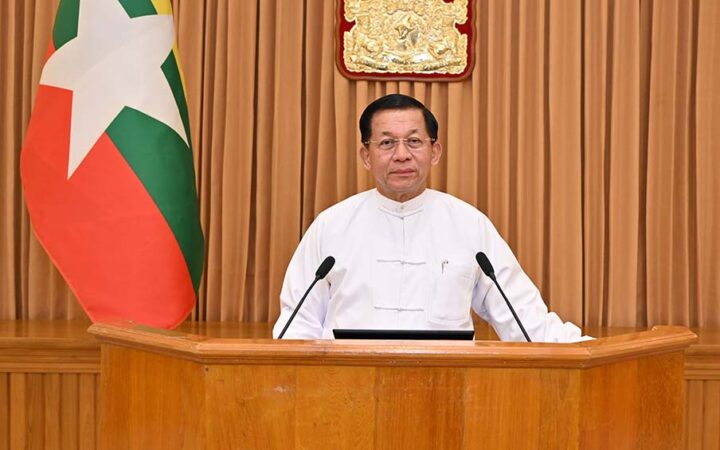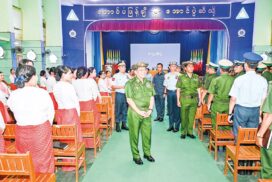The following is the full-text translation of an opening address sent by Chairman of the State Administration Council Prime Minister of the Republic of the Union of Myanmar Senior General Min Aung Hlaing to the ceremony to mark International Women’s Day 2024, today.
Everybody, Mingalaba!
First and foremost, I extended my greetings with best wishes to all distinguished guests attending the ceremony to mark International Women’s Day 2024 to enjoy physical and mental pleasure with all auspiciousness.
Today, 8 March, is designated as International Women’s Day, honouring the women worldwide. Hence, global countries celebrate the ceremony to mark International Women’s Day for further emphasizing the rights and capacity of women and profoundly implementing the development of women with acceleration on a yearly basis.
This year’s theme for International Women’s Day has been set as Invest in Women: Accelerate Progress. In accord with the theme, I would like to urge everyone to explore the best ways and means for women and girls to have a greater chance to participate in the economic sector while also ensuring access to education and health facilities in order to eliminate gender discrimination.
Currently, the theme of such a significant day motivates all global countries to notice that although the international community can enhance all sectors, women are considerably facing tremendous difficulties in participating in the economic sector on equal terms to men. On the other hand, the theme spotlights that if women and girls have equal rights with men in education, health, job opportunities, financial services and literacy, they will be sure to enjoy gender equality.
It can be said that fulfilling the needs of women and girls to enhance their capacity and helping them strengthen their capabilities of studies, earning incomes and leadership can be defined as good investments for the future.
Since 2020, the COVID-19 pandemic, geopolitical conflicts, natural disasters and economic instabilities have been pushing more than 75 million global population into poverty. Reportedly, if nobody conducts the necessary response to such a situation, more than 342 million women and girls worldwide will be under the poverty line in 2030.
Today’s majority of Myanmar females are capable of shouldering with males not only in families and societies but in all measures as well, including political, economic, peaceful and societal development. As such, it is necessary to take the strength of women to allow them to participate in the sectors required in order to modernize the country.
Literacy plays a pivotal role in the capacity enhancement of women. According to the surveys, women’s literacy rate worldwide scored 73.9 per cent in 2000, compared with 82.7 per cent in 2020. The literacy rate of women in the ASEAN region accounted for 89.7 per cent in 2000 but surged to 95.1 per cent in 2023. In Myanmar, women’s literacy rate reached 73 per cent in 2000 but 85 per cent in 2023.
It is necessary to invest in the education sector for women residing not only in urban but in rural areas and provide for girls and women who missed a chance to learn school education to learn vocational courses in order to stand tall in the community with their livelihoods. If so, they will be capable of independently operating their own businesses so as to develop women’s economic sector starting from the manageable-scale businesses.
According to the gender-based job opportunity survey worldwide (2023), the number of males who secured employment scored 66.57 per cent in 2020, and females 43.02 per cent, but the number of males who grasped employment reached 67.86 per cent in 2023 and females 43.82 per cent. It shows a gap in employment situations between males and females.
As such, the government is implementing plans for the development of micro-, small- and medium-scale enterprises (MSMEs) in which the majority of women can participate with the enhancement of necessary skills. The Social Security Law has been enacted to establish nursery units at factories and workplaces formed with more than 100 female workers to enable women to have no worries about family affairs.
As technology is crucial in job opportunities and businesses at present, women have to be capable of applying technology in conformity with the modern era. Surveys stated that a total of 27 per cent of the women in the global population are taking part in technology-applied workplaces, and 20 per cent of women are taking a leading role in the technological sector. Although there is no data on women who participate in technology-prone workplaces in Myanmar, female students account for 48 per cent of all students who attend technological universities and universities of computer studies. So, the government should arrange equal terms of rights for women to join employment opportunities in engineering, technology, and computer science without gender discrimination. It is necessary to conduct digital literacy courses for women to be able to apply technology. At present, the Department of Advanced Science and Technology under the Ministry of Science and Technology conducts human resource development courses and technological enhancement courses. The recruitment of trainees does not discriminate against gender, and if they conform to designated criteria, both males and females can join the training courses. Hence, it is necessary to arrange plans for women to participate in the training courses.
Moreover, the second term (2023-2032) of the national strategic plan for the development of women is being drafted for the enhancement of women’s capacity in the country. When it has been approved, relevant ministries and organizations have to cooperate in the implementation of the plan.
According to the statistics based on the 2014 population and housing census released on 1 October 2023, a total of 56.2 million people in Myanmar comprise 26.8 million men and 29.4 million women, who account for more than 52 per cent of the population. The Union report of the 2019 interim census mentioned 72.5 per cent of the literacy rate of people across the Union above 25 years old at the middle school level, consisting of 73.6 per cent for women and 72.4 per cent for men. The workable people scored 63.2 per cent nationwide, comprising 75.7 per cent of men and 52.7 per cent of women. The unemployment rate across the Union hit 2.7 per cent, including 2.1 per cent of men and 3.4 per cent of women. Moreover, the total population of the Union bears 61.5 per cent of employed persons, comprising 74.1 per cent of men and 50.9 per cent of women. The detailed clarification will be more comprehensive. Such factors show it is necessary to enhance the role of women. Hence, we have to make arrangements for women to have a greater chance to participate in the political, economical, peaceful and societal development undertakings with momentum based on the strength of women.
In conclusion, I would like to urge those in the private sector, non-governmental organizations, civil society organizations and all people to harmoniously cooperate with the government in investing in the women’s sector for its development in order to utilize the capacity of women who are more than a half strength of the Myanmar’s population and to have overall capacities in accord with this year’s theme “Invest in women: Accelerate progress”.
Thank you all.













